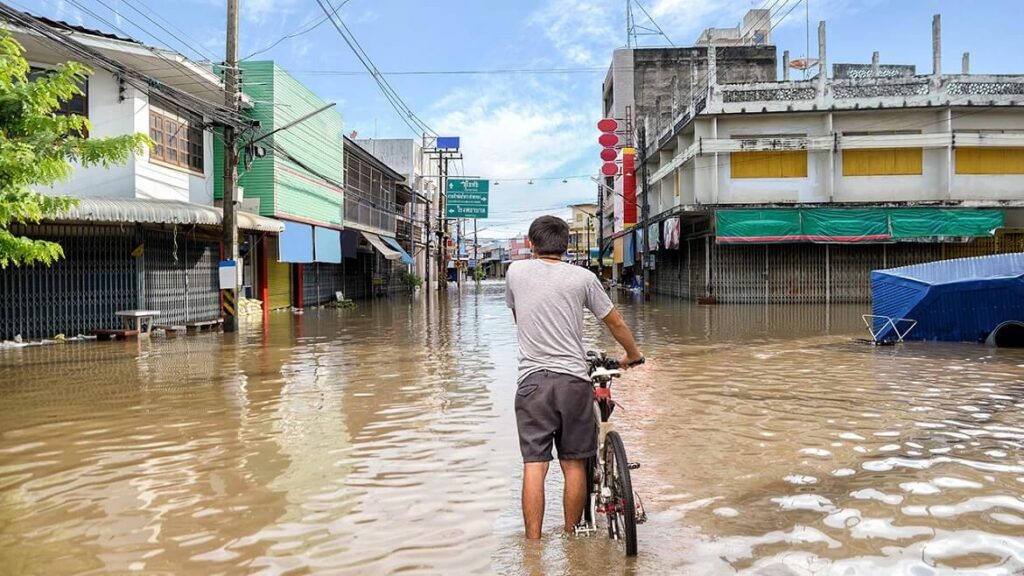By Naveed Ul Hasan
Climate change has transcended the boundaries of environmental science, becoming a central issue in global politics and foreign policy.

As the effects of climate change become increasingly evident, from rising sea levels to extreme weather events, nations around the world are recognizing that addressing climate change is not just an environmental imperative but a geopolitical necessity. In recent years, climate change has emerged as a critical foreign policy issue, shaping international relations, trade agreements, security strategies, and global governance. This transformation reflects the growing understanding that climate change poses existential threats to human security, economic stability, and international peace.
One of the most significant ways climate change has become a foreign policy issue is through its impact on global security. The increasing frequency and intensity of natural disasters, food and water shortages, and displacement of populations are all linked to climate change, and these challenges are now recognized as threats to national and global security. For example, the ongoing conflict in Syria has been partially attributed to a severe drought exacerbated by climate change, which led to mass migration from rural to urban areas, fueling social unrest and contributing to the outbreak of civil war.
Similarly, in regions like the Sahel in Africa, climate-induced resource scarcity has exacerbated conflicts between communities, leading to increased violence and instability. As climate change continues to stress the natural resources on which many communities depend, it is likely to intensify existing conflicts and create new ones, making it a critical issue for foreign policy and international security.
In addition to security concerns, climate change has also become a major factor in international trade and economic policy. The transition to a low-carbon economy, driven by the need to reduce greenhouse gas emissions, is reshaping global trade patterns and economic relationships.
Countries that are heavily reliant on fossil fuels, such as Saudi Arabia and Russia, face significant economic challenges as the world moves toward renewable energy sources. Conversely, countries that are leaders in green technology, such as Germany and China, are positioning themselves as economic powerhouses in the new global economy. This shift has led to new forms of economic competition and cooperation, as countries seek to secure access to critical resources like rare earth metals, which are essential for renewable energy technologies. Furthermore, trade agreements are increasingly incorporating climate-related provisions, as seen in the European Union’s Green Deal, which aims to make trade policies consistent with climate goals. As countries negotiate these new trade dynamics, climate change is becoming a central issue in foreign economic policy.
Another crucial aspect of climate change as a foreign policy issue is its role in shaping international governance and diplomacy. The global nature of climate change requires collective action, and this has led to the creation of numerous international agreements and institutions aimed at addressing the issue.
The Paris Agreement, adopted in 2015, is the most prominent example of this, representing a landmark in global climate diplomacy. The agreement, which commits countries to limiting global warming to well below 2 degrees Celsius above pre-industrial levels, has become a cornerstone of international climate policy.
However, the challenges of implementing the Paris Agreement have highlighted the complexities of global governance in the context of climate change. Disparities in economic development, historical emissions, and capacity to mitigate and adapt to climate impacts have led to tensions between developed and developing countries. These tensions are often reflected in international negotiations, where issues such as climate finance, technology transfer, and emissions reduction targets are hotly debated. As climate change continues to dominate the global agenda, it is likely to further influence the structures and dynamics of international governance.
The role of climate change in foreign policy is also evident in the way it is influencing bilateral and regional relationships. Climate change impacts are not distributed evenly across the globe, and this has led to varying levels of vulnerability among countries and regions.
Small island states, for example, are among the most vulnerable to rising sea levels and extreme weather events, and they have been at the forefront of climate diplomacy, advocating for stronger global action. Their efforts have led to the formation of alliances like the Alliance of Small Island States (AOSIS), which has been instrumental in pushing for ambitious climate targets in international negotiations.
Similarly, regional initiatives like the African Union’s Climate Change Strategy and the European Union’s climate policies reflect how regional organizations are incorporating climate change into their foreign policy agendas. These efforts underscore the importance of climate change as a factor in shaping regional and bilateral relations, as countries work together to address shared vulnerabilities and leverage collective action.
Climate change has also become a critical issue in the context of humanitarian and development policy, further integrating it into foreign policy frameworks. As climate impacts worsen, the number of climate refugees—people forced to leave their homes due to climate-related disasters—is expected to rise dramatically. The World Bank estimates that by 2050, climate change could displace over 140 million people in Sub-Saharan Africa, South Asia, and Latin America alone. This creates significant challenges for countries and regions already grappling with migration and displacement issues. In response, countries are increasingly incorporating climate change considerations into their development and humanitarian policies, recognizing that addressing climate-related vulnerabilities is essential for achieving long-term stability and development goals. This shift reflects the growing recognition that climate change is not just an environmental issue but a development and humanitarian challenge that requires a coordinated global response.
Finally, climate change is influencing the domestic and international politics of many countries, further entrenching it as a foreign policy issue. As public awareness of climate change grows, governments are facing increasing pressure from citizens, businesses, and civil society to take meaningful action. This has led to the rise of green political movements, the implementation of ambitious climate policies, and the integration of climate considerations into broader foreign policy strategies.
Countries like Sweden and New Zealand have positioned themselves as global leaders in climate action, using their foreign policy platforms to advocate for stronger international commitments. At the same time, climate change denial and resistance to climate policies have also become significant political issues, particularly in countries where fossil fuel industries are economically and politically powerful. The polarization of climate change politics in countries like the United States has had significant implications for international climate diplomacy, as changes in domestic political leadership can lead to abrupt shifts in foreign policy, as seen with the U.S. withdrawal from and subsequent rejoining of the Paris Agreement.
Climate change has become a central issue in foreign policy, shaping international relations, security strategies, trade, governance, and diplomacy. As the impacts of climate change continue to escalate, its influence on global politics will only grow, making it one of the defining challenges of the 21st century.
Addressing climate change requires not only robust environmental policies but also a comprehensive integration of climate considerations into foreign policy frameworks. As nations grapple with the complex and interconnected challenges posed by climate change, their ability to cooperate, innovate, and lead on this issue will determine the future of global stability and prosperity.
Author: Naveed-Ul-Hasan – PhD Scholar (International Relations). He is a Visiting lecturer at Karakoram International University. His research primarily investigates the strategic relations between Pakistan, China, India, and the USA. Additionally, his scholarly interests encompass a wide range of topics within South Asian studies, including extremism, radicalization, terrorism, the foreign policies of major global powers, and regional issues.
(The opinions expressed in this article are solely those of the author and do not necessarily reflect the views of World Geostrategic Insights).
Image Source: aspeninstitute.org







